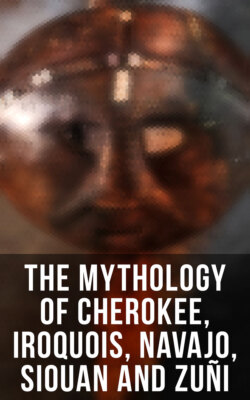Читать книгу The Mythology of Cherokee, Iroquois, Navajo, Siouan and Zuñi - James Mooney - Страница 267
На сайте Литреса книга снята с продажи.
Myths of the Athapascans
ОглавлениеThe great Athapascan family, who inhabit a vast extent of territory stretching north from the fifty-fifth parallel nearly to the Arctic Ocean, and westward to the Pacific, with cognate ramifications to the far south, are weak in mythological conceptions. Regarding them Bancroft says:4
"They do not seem in any of their various tribes to have a single expressed idea with regard to a supreme power. The Loucheux branch recognize a certain personage, resident in the moon, whom they supplicate for success in starting on a hunting expedition. This being once lived among them as a poor ragged boy that an old woman had found and was bringing up; and who made himself ridiculous to his fellows by making a pair of very large snow-shoes; for the people could not see what a starveling like him should want with shoes of such unusual size. Times of great scarcity troubled the hunters, and they would often have fared badly had they not invariably on such occasions come across a new broad trail that led to a head or two of freshly killed game. They were glad enough to get the game and without scruples as to its appropriation; still they felt curious as to whence it came and how. Suspicion at last pointing to the boy and his great shoes as being in some way implicated in the affair, he was watched. It soon became evident that he was indeed the benefactor of the Loucheux, and the secret hunter whose quarry had so often replenished their empty pots; yet the people were far from being adequately grateful, and continued to treat him with little kindness or respect. On one occasion they refused him a certain piece of fat—him who had so often saved their lives by his timely bounty! That night the lad disappeared, leaving only his clothes behind, hanging on a tree. He returned to them in a month, however, appearing as a man, and dressed as a man. He told them that he had taken up his home in the moon; that he would always look down with a kindly eye to their success in hunting; but he added that as a punishment for their shameless greed and ingratitude in refusing him the piece of fat, all animals should be lean the long winter through, and fat only in summer; as has since been the case.
"According to Hearne, the Tinneh believe in a kind of spirits, or fairies, called nantena, which people the earth, the sea, and the air, and are instrumental for both good and evil. Some of them believe in a good spirit called Tihugun, 'my old friend,' supposed to reside in the sun and in the moon; they have also a bad spirit, Chutsain, apparently only a personification of death, and for this reason called bad.
"They have no regular order of shamans; any one when the spirit moves him may take upon himself their duties and pretensions, though some by happy chances, or peculiar cunning, are much more highly esteemed in this regard than others, and are supported by voluntary contributions. The conjurer often shuts himself in his tent and abstains from food for days till his earthly grossness thins away, and the spirits and things unseen are constrained to appear at his behest. The young Tinneh care for none of these things; the strong limb and the keen eye, holding their own well in the jostle of life, mock at the terrors of the invisible; but as the pulses dwindle with disease or age, and the knees strike together in the shadow of impending death, the shaman is hired to expel the evil things of which a patient is possessed. Among the Tacullies a confession is often resorted to at this stage, on the truth and accuracy of which depend the chances of a recovery."
